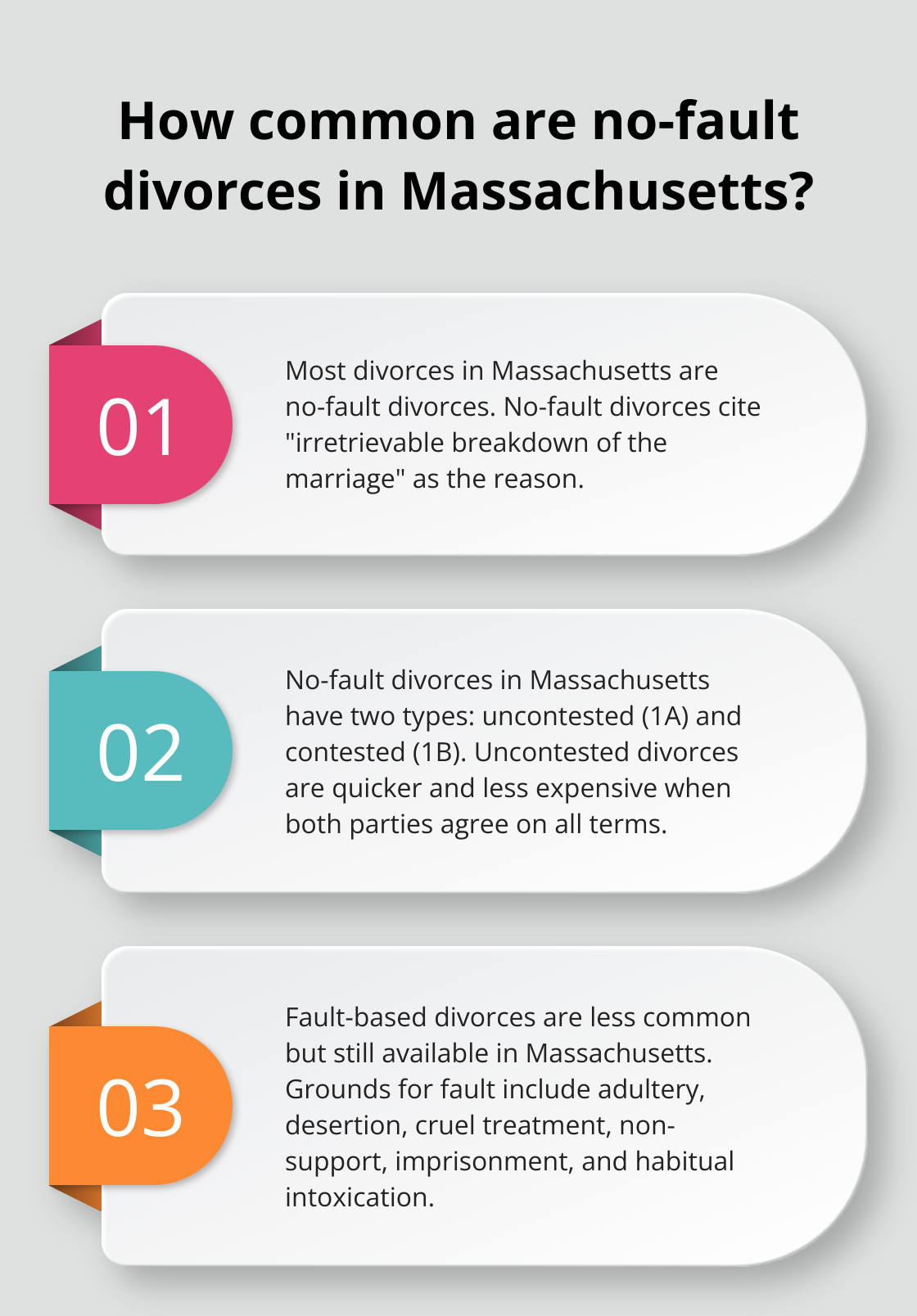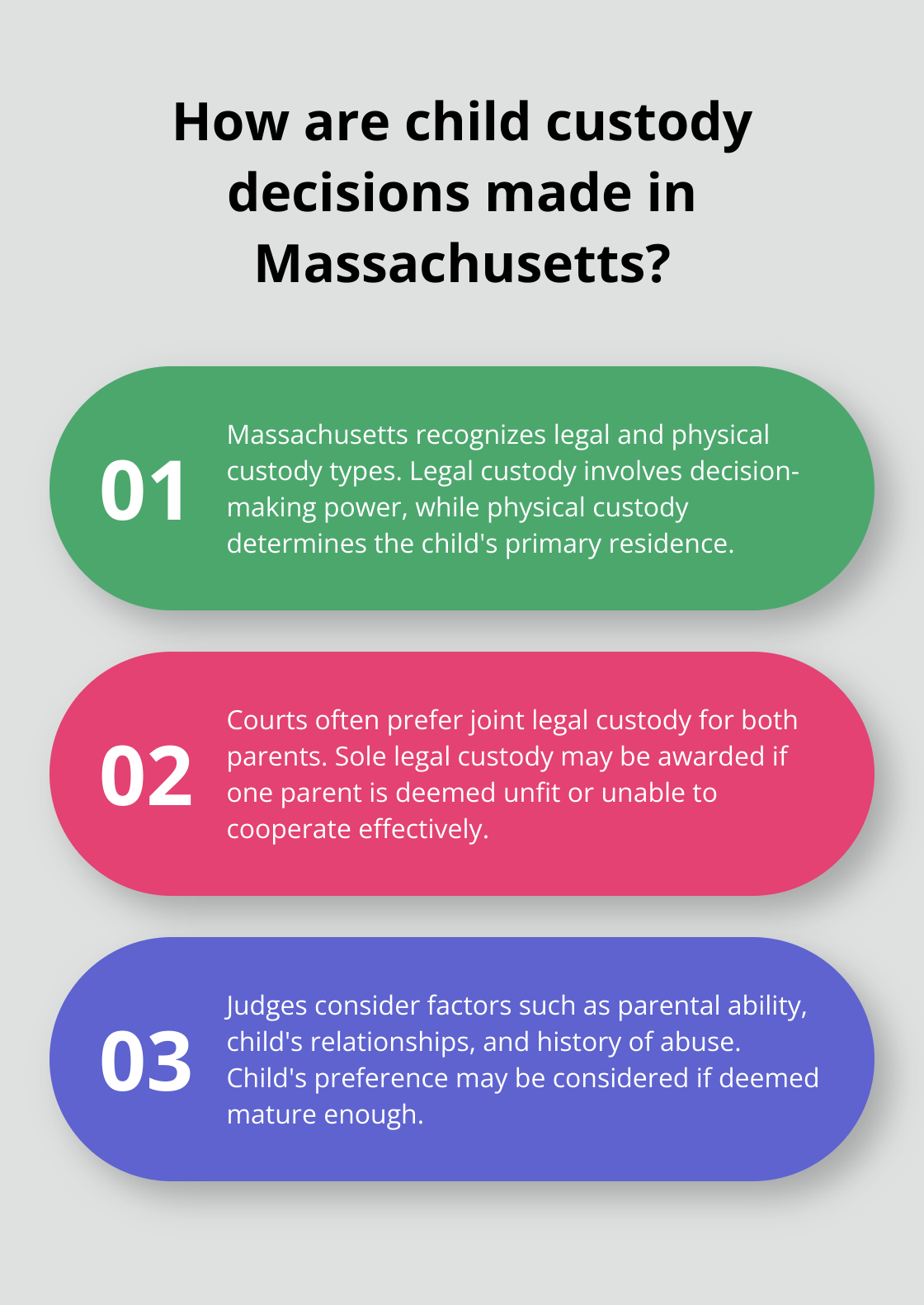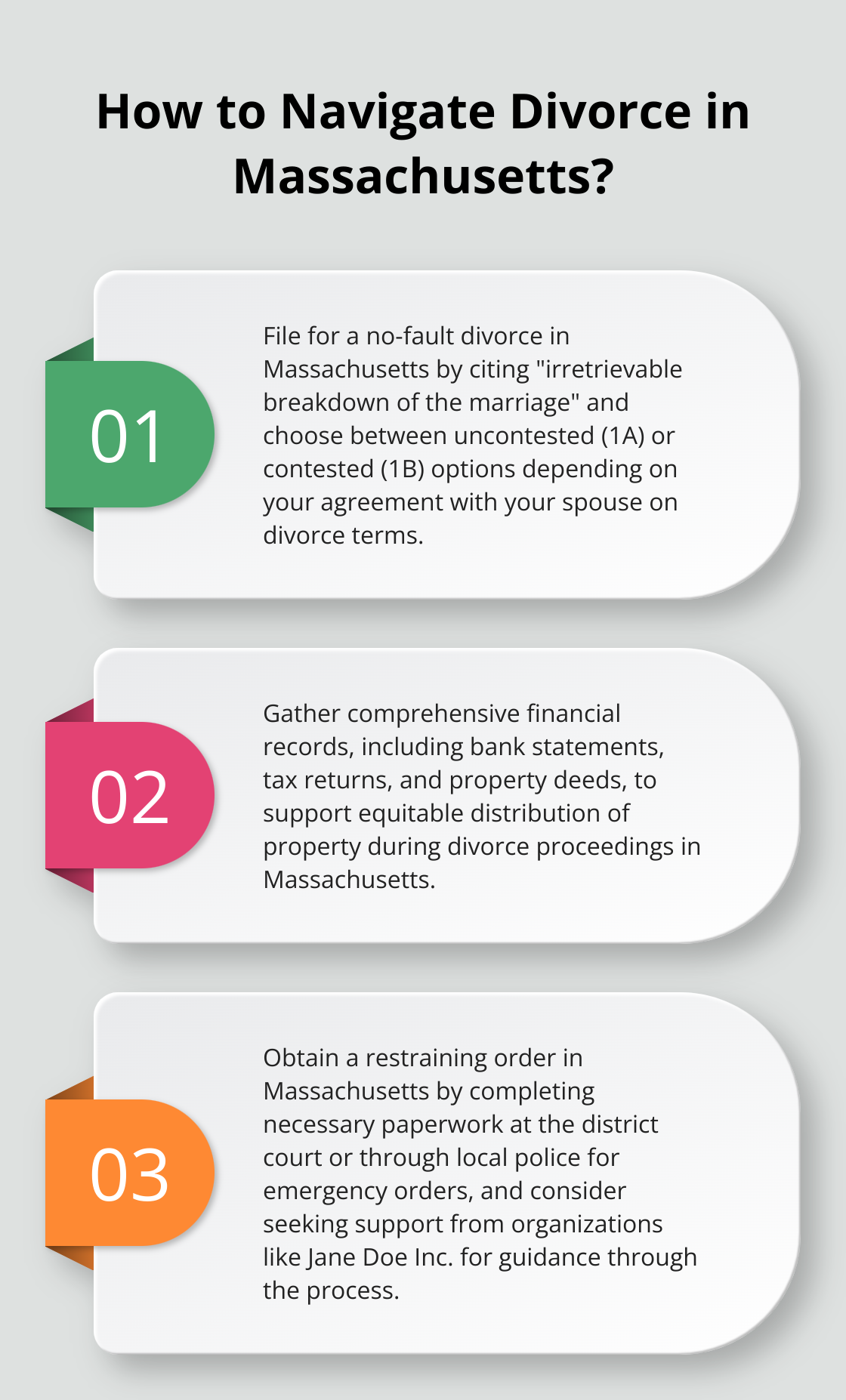
Common Family Law Issues: What You Need to Know
Family law issues can be complex and emotionally challenging. At Law Offices of Jeffrey A. Thompson, we understand the difficulties our clients face when dealing with these sensitive matters.
This guide explores common family law issues, including divorce proceedings, child custody, and domestic violence. We’ll provide essential information to help you navigate these legal challenges with confidence.
Navigating Divorce in Massachusetts
Understanding Divorce Options
Massachusetts offers two primary paths to end a marriage: fault-based and no-fault divorce. Each option has distinct implications for the divorce process.
No-Fault Divorce: The Common Choice
Most Massachusetts divorces fall under the no-fault category. This approach doesn’t assign blame to either spouse for the marriage’s end. Instead, it cites an “irretrievable breakdown of the marriage” as the reason. No-fault divorces come in two types:
- Uncontested (1A): Both parties agree on all terms, making this option quicker and less expensive.
- Contested (1B): Spouses disagree on one or more aspects of the divorce.
Fault-Based Divorce: Less Common but Available
While less frequent, fault-based divorces remain an option in Massachusetts. Grounds for fault include adultery, desertion, cruel and abusive treatment, non-support, imprisonment, and habitual intoxication. You can file for a fault divorce in person or by mail. Make sure you file the required forms and fees with the Probate and Family Court in the correct county.
Equitable Distribution of Property
Massachusetts follows equitable distribution laws for property division. This doesn’t automatically mean a 50-50 split. Courts consider various factors:
-
Length of the marriage
-
Each spouse’s income and employability
-
Contributions to the marriage (including as a homemaker)

Proper documentation of assets and debts plays a key role in this process. Gathering financial records (e.g., bank statements, tax returns, property deeds) early can streamline proceedings.
Alimony Considerations
Spousal support isn’t guaranteed in Massachusetts divorces. Courts weigh several factors when determining alimony:
-
Marriage duration
-
Age and health of both parties
-
Respective incomes and earning capacities
Massachusetts law provides guidelines for alimony duration based on marriage length.
As we move forward, let’s examine another critical aspect of family law: child custody and support matters. These issues often intertwine with divorce proceedings but require specific considerations to protect the best interests of children involved.
Child Custody Decisions in Massachusetts
Types of Custody
Massachusetts recognizes two primary forms of custody: legal and physical. Legal custody grants decision-making power for major life choices (education, healthcare). Physical custody determines the child’s primary residence.

Courts often prefer joint legal custody, allowing both parents to participate in important decisions. However, sole legal custody may be awarded if one parent is deemed unfit or unable to cooperate effectively.
Physical custody arrangements vary widely, including:
- Primary physical custody with one parent (visitation for the other)
- Shared physical custody (roughly equal time between households)
- Bird’s nest custody (children remain in the family home, parents alternate residency)
Factors Influencing Custody Decisions
Massachusetts judges weigh numerous factors when determining custody arrangements:
- Each parent’s ability to meet the child’s needs
- The child’s relationship with each parent and siblings
- The child’s adjustment to home, school, and community
- Any history of abuse or neglect
- Each parent’s willingness to support the child’s relationship with the other parent
- The child’s preference (if deemed mature enough)
Presenting compelling evidence supports desired custody arrangements. This may involve gathering school records, medical reports, or testimony from character witnesses.
Child Support Guidelines
Massachusetts uses a specific formula to calculate child support payments. Primary factors include:
- Gross income of both parents
- Number of children
- Childcare and health insurance costs
- Parenting time
The Massachusetts Child Support Guidelines Worksheet provides a starting point for calculations. Judges may deviate from these guidelines in certain circumstances.
Accurate reporting of all income sources is essential (salary, bonuses, rental income, unemployment benefits). Failure to disclose income can result in severe penalties.
Modifying Custody and Support Orders
Life changes often necessitate updates to existing custody and support arrangements. Common reasons for modifications include:
- Significant changes in income
- Relocation of one parent
- Changes in the child’s needs (e.g., medical conditions)
- Alterations in parenting time
To modify an existing order, you must demonstrate a material change in circumstances since the original order was issued. This process can be complex, and courts typically require substantial evidence to justify changes.
As we transition to our next topic, it’s important to address another critical aspect of family law: domestic violence and restraining orders. These issues can significantly impact custody decisions and require immediate legal attention to ensure the safety of all parties involved.
Domestic Violence Protection in Massachusetts
Understanding Domestic Violence
Intimate partner violence is primarily a crime against women. Although domestic violence affects women, men, children and elders, women are most often the victims of this type of abuse. Massachusetts law defines domestic violence as a pattern of coercive and controlling behaviors used by one person to gain power over another in an intimate relationship. This includes physical abuse, emotional manipulation, financial control, and sexual coercion.
Obtaining a Restraining Order
Victims of domestic violence can seek protection through restraining orders. In Massachusetts, two primary options exist:
- Emergency restraining orders (available 24/7 through local police departments)
- 209A orders (filed at district courts during business hours)

The process to obtain a restraining order involves:
- Completing necessary paperwork detailing the abuse
- Appearing before a judge to explain the situation
- Serving the order to the abuser (typically done by law enforcement)
Organizations like Jane Doe Inc. provide advocates to support victims through each step of this process.
Legal Consequences of Order Violations
Violating a restraining order in Massachusetts constitutes a criminal offense. Penalties may include:
-
Jail time (up to 2.5 years)
-
Fines (up to $5,000)
-
Mandatory completion of a batterer’s intervention program
Repeat violations result in more severe punishments. Both the protected party and the subject of the order must fully understand its terms to avoid legal complications.
Support Resources for Survivors
Massachusetts offers various resources for those affected by domestic violence:
-
SafeLink Hotline: A 24/7 multilingual helpline (877-785-2020)
-
DOVE (Domestic Violence Ended): Provides emergency shelter and support services
-
Community-based programs: Offer counseling, legal advocacy, and safety planning
Legal Assistance in Domestic Violence Cases
At Law Offices of Jeffrey A. Thompson, we understand the complexities of domestic violence cases. Our team can guide you through the legal process, whether you seek protection or need to defend against false accusations. We prioritize your safety and work to ensure your rights are protected throughout the legal proceedings.
Final Thoughts
Common family law issues can overwhelm individuals and families. These challenges require expert guidance to protect rights and achieve favorable outcomes. At Law Offices of Jeffrey A. Thompson, we offer compassionate and knowledgeable representation tailored to your specific needs.

Prompt action is essential when facing family law challenges. Gather all relevant documents and information related to your case (financial records, communication logs, incident reports). Contact a qualified family law attorney who will assess your situation and outline your legal options.
Family law matters don’t have to be faced alone. With the right legal support, you can navigate these challenges with confidence. We at Law Offices of Jeffrey A. Thompson commit to stand by your side, advocate for your rights, and help you achieve the best possible resolution to your family law concerns.


